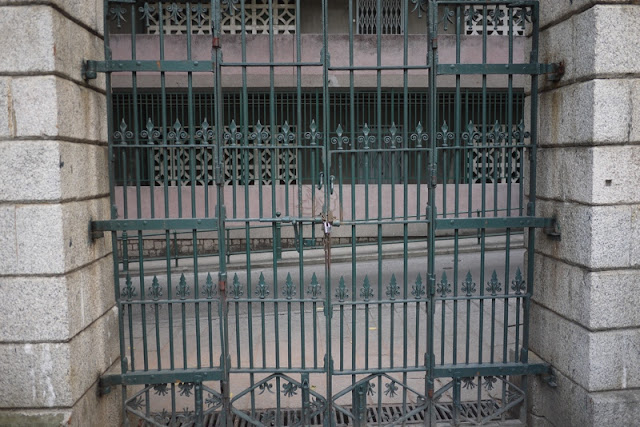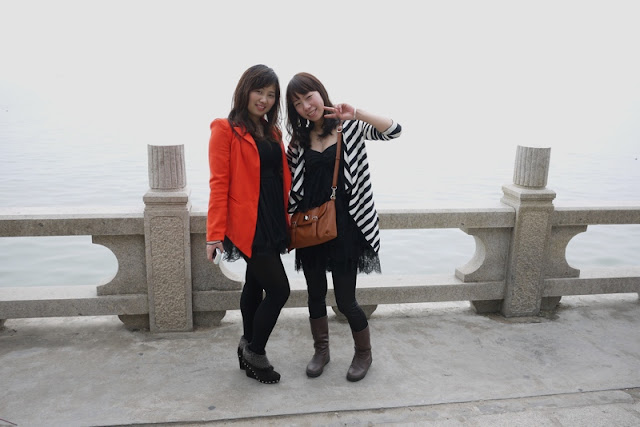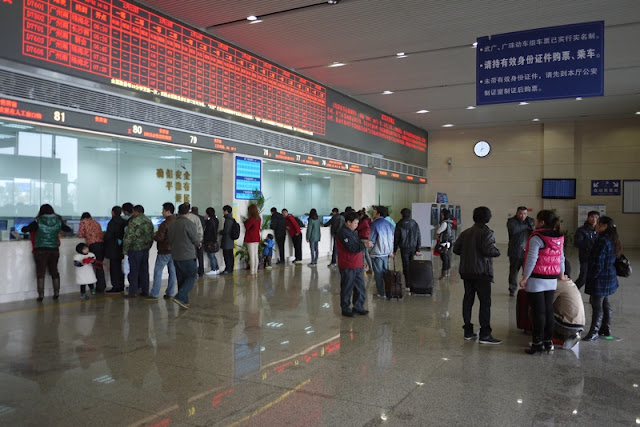Showing posts with label Macau. Show all posts
Showing posts with label Macau. Show all posts
Thursday, March 29, 2012
Monday, March 19, 2012
"O Santos": A Taste of Portugal in China
Posted by
Brian Glucroft
at
11:30 PM
I plan to share more of what I found after taking a random bus that brought me to Nanping. However, it appears that a video I would like to use for the next post needs much more time to finish uploading. So, in the meantime I will share one of my recent experiences in nearby Macau.
Although Portugal no longer administers Macau, the Portuguese influence can still be found. A benefit of this is that I could have a "local" meal of Portuguese food today even though I was still in China. Since I was in Macau's Taipa Village, I stopped by this well-known restaurant for lunch:
After taking a seat I opened the menu with great delight. The first dish was an easy choice for me:
And for the main dish I stuck with the seafood theme:
Everyone else seemed to be finishing their meal with an expresso, so I decided to do the same with a little improvisation:
One of the more remarkable moments of the meal occurred with a very simple item -- the free bread. As soon as I bit into it I realized it had been a long time since I had last enjoyed this style of bread -- the crust! I will not belabor my impressions of the food and will just say that I enjoyed every bite. The food, the house wine, the espresso, and the friendly people were just what I needed to make the more than 90 minutes needed to pass through immigration at the Macau border with mainland China seem like a distant memory and well worthwhile.
The owner heartily thanked me as I left the restaurant, and I tried my best to express that I should be the one doing the thanking.
So, again, "Muito obrigado!"
Although Portugal no longer administers Macau, the Portuguese influence can still be found. A benefit of this is that I could have a "local" meal of Portuguese food today even though I was still in China. Since I was in Macau's Taipa Village, I stopped by this well-known restaurant for lunch:
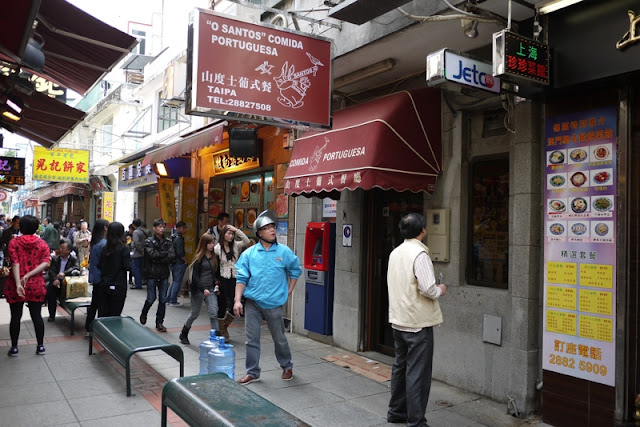 |
| "O Santos" Comida Portuguesa restaurant |
After taking a seat I opened the menu with great delight. The first dish was an easy choice for me:
 |
| Octopus Salad |
And for the main dish I stuck with the seafood theme:
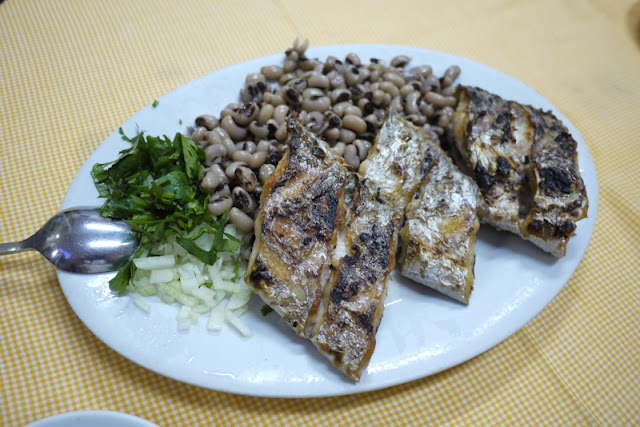 |
| Grilled fish and beans |
Everyone else seemed to be finishing their meal with an expresso, so I decided to do the same with a little improvisation:
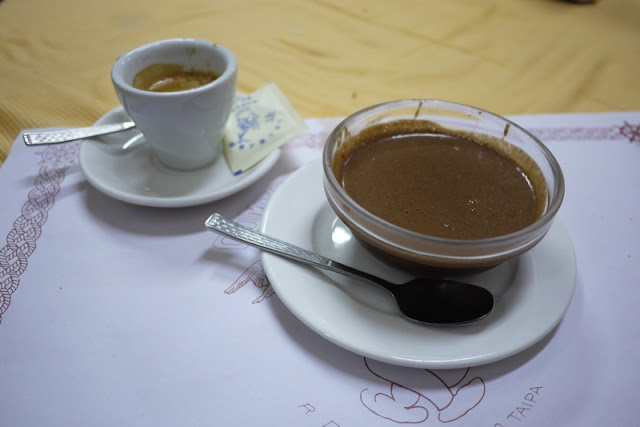 |
| Espresso and chocolate mousse |
One of the more remarkable moments of the meal occurred with a very simple item -- the free bread. As soon as I bit into it I realized it had been a long time since I had last enjoyed this style of bread -- the crust! I will not belabor my impressions of the food and will just say that I enjoyed every bite. The food, the house wine, the espresso, and the friendly people were just what I needed to make the more than 90 minutes needed to pass through immigration at the Macau border with mainland China seem like a distant memory and well worthwhile.
The owner heartily thanked me as I left the restaurant, and I tried my best to express that I should be the one doing the thanking.
So, again, "Muito obrigado!"
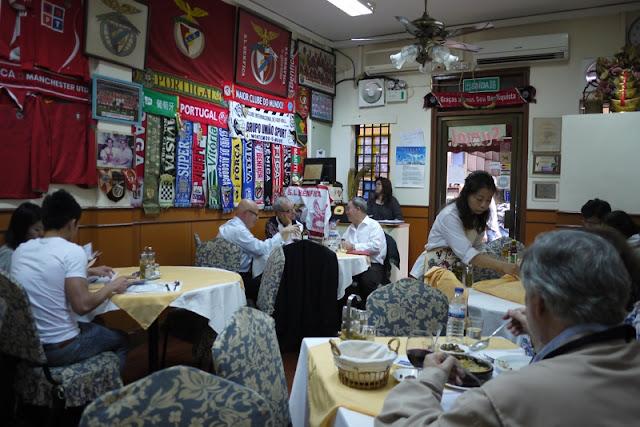 |
| Inside of "O Santos" -- The owner is sitting in the center at the farthest table. |
Tuesday, February 21, 2012
Cigarettes, Noodles, and Diapers: Profiting from China's Internal Borders
Posted by
Brian Glucroft
at
11:57 PM
At Zhuhai's Gongbei Port (拱北口岸) in China's Guangdong province one can see a steady stream of people exiting immigration at the border between Macau and mainland China.
Numerous people pass through the border for a variety of purposes. One of those purposes is very pragmatic.
Sometimes it is apparent that many people are openly carrying at least one of several items. For example, these three women were each carrying a box of instant noodles and a box of cigarettes:
While some people may be bringing these items from Macau for themselves or to give away as gifts, it is clear many have another goal in mind -- selling them as part of a large grey market in mainland China.
For example, some people will sell their box of cigarettes to buyers on the other side of the street from Gongbei Port:
Though at other times, people can sell their cigarettes immediately upon exiting the Gongbei Port building:
Especially for selling other items, some walk a little further and head down an alley with a warehouse-like building including many individual "stores". The sales patterns can vary from day to day. On one day there was a store where people could sell a brand of Japanese instant noodles (出前一丁) without waiting in line. However, people carrying another item had to stand in a long line:
In Chinese I asked one of the men apparently working in the area, "What is this?"
He replied, "This is nothing."
I did not feel the need to continue the discussion since it was already clear that this "nothing" was in fact people selling a highly desired item in mainland China: Merries diapers from Japan.
Why do these items need to be brought from Macau? Due to their status as special administrative regions, both Macau and Hong Kong sell goods that for a variety of reasons are not available (or as easily available) through official channels in mainland China. However, in some cases a grey market sales network in mainland China exists as I previously described for the iPhone 4S. The border at Macau and Zhuhai is particularly convenient for transporting some of these goods since both cities have urban areas immediately adjacent to the border. Not surprisingly, many of the stores in Macau near the border sell the very items that are most desired by mainland Chinese.
There can be a variety of reasons as to why these goods are in particular demand. For some, such as the diapers, it is due to the perceived safety and quality of equivalent products made in mainland China. The article "What Chinese Shoppers are Buying Online" on Forbes discussed this issue:
Based on what I saw, it appears that due to customs' restrictions people are very limited in the number of items they can bring to Zhuhai (I rarely saw people carrying more than one package of the above-mentioned items). However, last August Dan Harris on the China Law Blog commented that the situation was far more flexible at another border at that time:
There appear to be several other fascinating aspects of how the various grey markets seen at the Zhuhai-Macau border operate such as people being typically paid in Macanese currency, sellers reportedly making multiple trips in a day across the border, and variations on which items are "popular" from day to day. I will refrain from commenting on them, since I am still fuzzy on a number of issues. Regardless, it is striking that a grey market can apparently thrive for items such as instant noodles that need to be carried one by one across two immigration checkpoints.
So, like the Shanghainese reader who expressed an understanding for Macau's and Hong Kong's borders due to concerns over protecting cities' cultures, there are other mainland Chinese who may have their own reasons to appreciate the borders. While some mainland Chinese are not supportive of the policies which restrict their travel within China, for others the borders combined with special rules for Hong Kong and Macau provide an opportunity for profit.
Numerous people pass through the border for a variety of purposes. One of those purposes is very pragmatic.
Sometimes it is apparent that many people are openly carrying at least one of several items. For example, these three women were each carrying a box of instant noodles and a box of cigarettes:
While some people may be bringing these items from Macau for themselves or to give away as gifts, it is clear many have another goal in mind -- selling them as part of a large grey market in mainland China.
For example, some people will sell their box of cigarettes to buyers on the other side of the street from Gongbei Port:
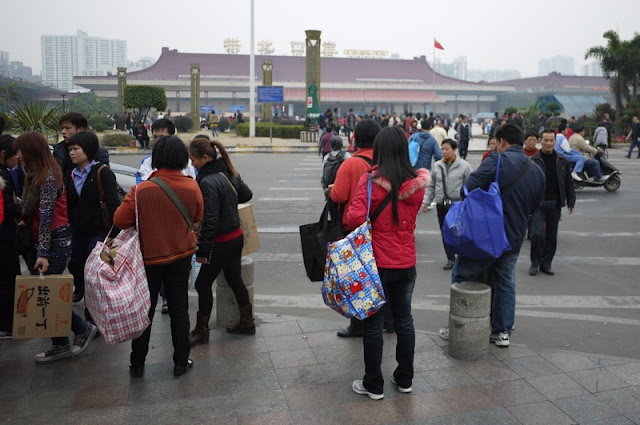 |
| People with larger colored bags are just some of the buyers that can be found in this area. |
Though at other times, people can sell their cigarettes immediately upon exiting the Gongbei Port building:
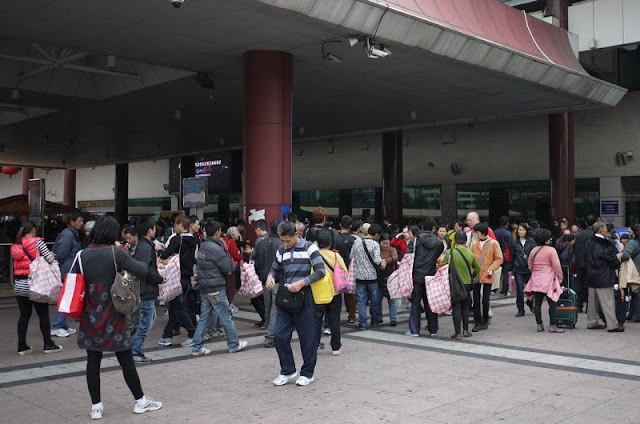 |
| Buyers (in this case all have plaid-patterned bags) quickly clear out if people with the appropriate uniforms arrive. |
Especially for selling other items, some walk a little further and head down an alley with a warehouse-like building including many individual "stores". The sales patterns can vary from day to day. On one day there was a store where people could sell a brand of Japanese instant noodles (出前一丁) without waiting in line. However, people carrying another item had to stand in a long line:
In Chinese I asked one of the men apparently working in the area, "What is this?"
He replied, "This is nothing."
I did not feel the need to continue the discussion since it was already clear that this "nothing" was in fact people selling a highly desired item in mainland China: Merries diapers from Japan.
Why do these items need to be brought from Macau? Due to their status as special administrative regions, both Macau and Hong Kong sell goods that for a variety of reasons are not available (or as easily available) through official channels in mainland China. However, in some cases a grey market sales network in mainland China exists as I previously described for the iPhone 4S. The border at Macau and Zhuhai is particularly convenient for transporting some of these goods since both cities have urban areas immediately adjacent to the border. Not surprisingly, many of the stores in Macau near the border sell the very items that are most desired by mainland Chinese.
There can be a variety of reasons as to why these goods are in particular demand. For some, such as the diapers, it is due to the perceived safety and quality of equivalent products made in mainland China. The article "What Chinese Shoppers are Buying Online" on Forbes discussed this issue:
Recalling the terrible fall 2008 mass poisoning incident when six Chinese babies died and hundreds of thousands of children were sickened by melamine-tainted milk, it is no surprise that Japanese-made infant powdered milk is among the top-selling products. Some Chinese believe that direct Internet sales and home deliveries of powdered milk products would ensure that the contents had not been altered...And it is not just Chinese who are concerned. Some foreigners residing in mainland China have also turned to the Internet to purchase baby supplies produced elsewhere (see here for one perspective).
Also in the “baby” category are best-selling Japanese diapers, including the Kao “Merry” or Unicharm “Moony” brands (128 yuan/US$19)–again, priced higher compared to local brands. Chinese parents believe that the diapers contain no harmful chemicals that cause allergies or rash, and the materials are top-notch, preventing spillage.
Based on what I saw, it appears that due to customs' restrictions people are very limited in the number of items they can bring to Zhuhai (I rarely saw people carrying more than one package of the above-mentioned items). However, last August Dan Harris on the China Law Blog commented that the situation was far more flexible at another border at that time:
An interesting thing is happening on the "border" between Hong Kong and China.It is not uncommon for the various border "policies" to change (sometimes without official notice) so this difference comes as no great surprise.
Nothing.
Let me explain.
Like virtually all countries, China has various limits and duties relating to what can be brought into the country. China is generally quite good at enforcing these limits and duties.
Except for quite some time now it has been looking the other way when it comes to food imports from Hong Kong. If you go to the border between Hong Kong and China, you will see what I mean. There you will see many, many people bringing back into China massive quantities of baby formula and the customs people are doing nothing. Nothing. The same is true for all sorts of other packaged foods being brought into China.
There appear to be several other fascinating aspects of how the various grey markets seen at the Zhuhai-Macau border operate such as people being typically paid in Macanese currency, sellers reportedly making multiple trips in a day across the border, and variations on which items are "popular" from day to day. I will refrain from commenting on them, since I am still fuzzy on a number of issues. Regardless, it is striking that a grey market can apparently thrive for items such as instant noodles that need to be carried one by one across two immigration checkpoints.
So, like the Shanghainese reader who expressed an understanding for Macau's and Hong Kong's borders due to concerns over protecting cities' cultures, there are other mainland Chinese who may have their own reasons to appreciate the borders. While some mainland Chinese are not supportive of the policies which restrict their travel within China, for others the borders combined with special rules for Hong Kong and Macau provide an opportunity for profit.
Sunday, February 19, 2012
Should Shanghai Have Borders?
Posted by
Brian Glucroft
at
11:58 PM
Today, as I saw this scene of people in Zhuhai looking across the harbor (Qianshan Waterway) at Macau:
I recalled a scene from last summer in Shanghai of people looking across the river at Pudong district's modern skyline:
Despite the similarities in the two scenes, including a bit of smog, while mainland Chinese need a permit to enter Macau, no permit is required for them to enter Shanghai's Pudong district -- one of China's most developed areas. Regarding Shanghai, a Chinese reader from there responded to my post about Macau's border with mainland China with these comments [English slightly edited for clarity]:
The reader's comments provide much fodder for discussion. For now, I share them simply to highlight a mainland Chinese perspective on the borders that may not have been expected without a deeper understanding of China. I am sure there are a variety of other perspectives that could be found in China and Shanghai as well. In the post about Macau's border I wrote [emphasis added]:
I recalled a scene from last summer in Shanghai of people looking across the river at Pudong district's modern skyline:
Despite the similarities in the two scenes, including a bit of smog, while mainland Chinese need a permit to enter Macau, no permit is required for them to enter Shanghai's Pudong district -- one of China's most developed areas. Regarding Shanghai, a Chinese reader from there responded to my post about Macau's border with mainland China with these comments [English slightly edited for clarity]:
I can understand why Macau and Hong Kong have these rules.In response to the title of this post, no, she does not feel that Shanghai should have borders separating it from the rest of China. And though she will need a permit to do so, she hopes to visit both Hong Kong and Macau someday.
I don't want my own culture to be changed, even my own city [Shanghai] will be captured. Lots of people are too aggressive here. So many people come here but they actually don't like it. They condemn our city, our language, our rules, and they want to change things here. They hate Shanghainese.
The reader's comments provide much fodder for discussion. For now, I share them simply to highlight a mainland Chinese perspective on the borders that may not have been expected without a deeper understanding of China. I am sure there are a variety of other perspectives that could be found in China and Shanghai as well. In the post about Macau's border I wrote [emphasis added]:
Despite growing up in a cultural environment very different from most Chinese, I suspect I would be asking questions very similar to those that some people in China are now asking.The "some" is of course very key in terms of appreciating the variety of views held by China's people. Additionally, there can be a diverse set of factors guiding these views. Just the comments above from a single person touch on several very important issues for China such as the rapid pace of change, the variety of cultures, and the divisions between certain groups of people. Even an issue that could seem so straightforward from the outside, the views of mainland Chinese on borders restricting their own travel within China, is full of complexities. Once again, there are many layers.
Thursday, February 16, 2012
So Close Yet So Far: Chinese Citizens Without Permission to Visit China's Macau
Posted by
Brian Glucroft
at
11:58 PM
While walking along China's Pearl River Estuary (珠江口) in Zhuhai, Guangdong province I briefly spoke with these two young women:
This couple living in Zhuhai:
These two tourists from China's Hunan province:
And these two young men visiting from China's Jiangxi province:
All of these Chinese had one thing in common: they were not able to visit the location seen in the background of the first and last photos -- Macau -- despite it being part of their own country and within reach by an easy overland walk. None of them had the appropriate special permit. Even if they had a passport they would not have been allowed to enter. Macau, like Hong Kong, is one of China's special administrative regions with its own laws, currency, police, and immigration policies. And like Hong Kong's border, Macau's border can be a blockade to people from mainland China.
However, if you are not from China getting into Macau can be much easier. According to a table on the website for the Macau Public Security Police Force's Immigration Service people from the following countries are currently exempt from needing to apply for any visa or entry permit and only need their passport:
-(a total of 69 countries)-
Additionally, Hong Kong residents are exempt from needing a visa or permit.
There are some minor loopholes to the restrictions for mainland Chinese. For example, if a mainland Chinese citizen has a passport, proof of an onward flight from Macau, and an entry visa to another country then they are able to enter Macau for a period of up to 7 days. In other words, in China a visa to another country can open the door to a section of one's own country.
Despite the restrictions, it could be argued that relative to Macau's population a large number of mainland Chinese have had access. In fact, as currently noted on Wikipedia "According to the 2006 by-census, 47% of [Macau's] residents were born in mainland China, of whom 74.1% were born in Guangdong and 15.2% in Fujian." Also, mainland Chinese play important roles as tourists and workers, especially for Macau's famous and very large gambling industry. The Independent reported several years ago:
Whatever justifications there may be for the permits, their effects may be broader than they initially appear. In addition to impacting the travels of many mainland Chinese, these conditions may also affect people's sense of identity and self-worth. Some Chinese are publicly asking why people from a variety of other countries such as Japan, India, and Mongolia can more easily visit some parts of China than is possible for themselves. Some are also asking how they can expect to be treated as equals abroad when they are not even treated as equals within their own country.
It is not clear whether any significant changes are imminent and whether it is an issue of prime importance for many in country that faces a variety of immense challenges. Regardless, I could not stop myself from wondering what it is like for the people I met to gaze upon one of the more developed areas of China and know that they do not have permission to even walk along its streets. I try to imagine what it would be like for me to stand in the U.S. state of New Jersey and look across the water at New York City knowing that I would need to apply for a government permit to visit even though a Chinese citizen with a passport could enter at any time. Despite growing up in a cultural environment very different from most Chinese, I suspect I would be asking questions very similar to those that some people in China are now asking.
This couple living in Zhuhai:
These two tourists from China's Hunan province:
And these two young men visiting from China's Jiangxi province:
All of these Chinese had one thing in common: they were not able to visit the location seen in the background of the first and last photos -- Macau -- despite it being part of their own country and within reach by an easy overland walk. None of them had the appropriate special permit. Even if they had a passport they would not have been allowed to enter. Macau, like Hong Kong, is one of China's special administrative regions with its own laws, currency, police, and immigration policies. And like Hong Kong's border, Macau's border can be a blockade to people from mainland China.
However, if you are not from China getting into Macau can be much easier. According to a table on the website for the Macau Public Security Police Force's Immigration Service people from the following countries are currently exempt from needing to apply for any visa or entry permit and only need their passport:
| Andorra | Indonesia | Bosnia and Herzegovina |
| Australia | Ireland | Norway |
| Austria | Israel | Philippines |
| Belgium | Italy | Poland |
| Brazil | Japan | Portugal |
| Canada | Kiribati | Romania |
| Chile | Latvia | Samoa |
| Croatia | Lebanon | Seychelles |
| Cyprus | Liechtenstein | Singapore |
| Czech | Lithuania | Slovak |
| Denmark | Luxembourg | Slovenia |
| Egypt | Macedonia | South Africa |
| Estonia | Malaysia | South Korea |
| Finland | Mali | Spain |
| France | Malta | Sweden |
| Germany | Mexico | Switzerland |
| Greece | Monaco | Tanzania |
| Hungary | Mongolia | Thailand |
| Iceland | Namibia | Turkey |
| India | Netherlands | United Kingdom |
| Cape Verde | New Zealand | Uruguay |
| Commonwealth of Dominica | Bulgaria | U.S.A. |
| San Marino | Montenegro | Brunei |
Additionally, Hong Kong residents are exempt from needing a visa or permit.
There are some minor loopholes to the restrictions for mainland Chinese. For example, if a mainland Chinese citizen has a passport, proof of an onward flight from Macau, and an entry visa to another country then they are able to enter Macau for a period of up to 7 days. In other words, in China a visa to another country can open the door to a section of one's own country.
Despite the restrictions, it could be argued that relative to Macau's population a large number of mainland Chinese have had access. In fact, as currently noted on Wikipedia "According to the 2006 by-census, 47% of [Macau's] residents were born in mainland China, of whom 74.1% were born in Guangdong and 15.2% in Fujian." Also, mainland Chinese play important roles as tourists and workers, especially for Macau's famous and very large gambling industry. The Independent reported several years ago:
Two-thirds of Macau's gamblers are mainland Chinese, most of them from just across the border in the prosperous province of Guangdong...As the article suggests, whether the permits for mainland Chinese are approved fairly is another question.
Only Macau residents can work as croupiers in the casinos, but pouring the tea, emptying the ashtrays, building the new casinos and guarding the loot as it is transported off to the banks is the enclave's army of 98,000 foreign workers. Like the gamblers, most of these migrant workers come from across the border in Guangdong...
Whatever justifications there may be for the permits, their effects may be broader than they initially appear. In addition to impacting the travels of many mainland Chinese, these conditions may also affect people's sense of identity and self-worth. Some Chinese are publicly asking why people from a variety of other countries such as Japan, India, and Mongolia can more easily visit some parts of China than is possible for themselves. Some are also asking how they can expect to be treated as equals abroad when they are not even treated as equals within their own country.
It is not clear whether any significant changes are imminent and whether it is an issue of prime importance for many in country that faces a variety of immense challenges. Regardless, I could not stop myself from wondering what it is like for the people I met to gaze upon one of the more developed areas of China and know that they do not have permission to even walk along its streets. I try to imagine what it would be like for me to stand in the U.S. state of New Jersey and look across the water at New York City knowing that I would need to apply for a government permit to visit even though a Chinese citizen with a passport could enter at any time. Despite growing up in a cultural environment very different from most Chinese, I suspect I would be asking questions very similar to those that some people in China are now asking.
Tuesday, February 14, 2012
From Guangzhou to Zhuhai to Macau
Posted by
Brian Glucroft
at
9:06 PM
[Update at end]
I have not posted during the past couple days due to some travel. It started in Guangzhou where I took a 40 minute subway ride to Guangzhou's South Train Station, one of several train train stations in Guangzhou and one of the many mammoth new train stations that can be found in a number of cities in China.
When I arrived I first sought out these machines to purchase a ticket:
ID is now required to purchase tickets. Unfortunately, the scanning system for the machines appears to only read Chinese Resident Identity Cards and not passports. After discovering this fact I went to the old fashioned ticket windows in a different section of the station:
Anyone familiar with Chinese train stations will appreciate my relief in finding such short and well defined lines. The scene would be very different in many other train stations in China. Even with the short wait, though, the train I wanted to ride had sold out since I had checked it on the automated machines. Fortunately, a few first class seats were remaining on the train departing only 30 minutes later. Some high speed rail lines in China have reported low ridership numbers. All I can say is that with trains departing every 15-30 minutes this line appeared to be very busy that day.
After purchasing the tickets I entered the sprawling main departure hall:
And after passing through security I was in the waiting area:
But there was no need to wait and I headed directly to the train:
While the train line I rode is sometimes referenced as "light rail", the trains do not in fact fit that classification. So, I will call it by its more proper name: the Guangzhou–Zhuhai Intercity Railway.
Traveling at speeds up to 200 km/h (124 mph) I arrived in about 50 minutes at the terminal station -- Zhuhai North Station. Apparently the line will someday extend to a more central location in Zhuhai. One can only hope. As it stood, after paying just 44 RMB (about US $7) for the train ticket I paid almost double that for the long taxi ride into town. City buses were available for only 1 RMB but they did not go exactly where I wanted and included many stops. Also, they were already full with recently arrived passengers, and I was not sure there would even be space for me when the next ones arrived. While I enjoy trying to ride "local" in China, this was a time where I decided to take a pass. Fortunately, I got my money's worth as my taxi driver apparently had aspirations to be a Formula One driver.
The day after arriving in Zhuhai I went to Macau. Similar to what I explained in my post about the border between Hong Kong and Shenzhen, you must pass out of mainland China through immigration in Zhuhai and then take a short walk before going through immigration once more to enter the special administrative region of Macau, despite it being part of China. And like Hong Kong, mainland Chinese need a special permit to enter Macau while many foreigners, including myself, only need a passport. From the time I left my hotel, walking to the border, going through two immigration channels, and finally arriving in Macau took less than one hour. It was even faster when I returned to Zhuhai due to shorter lines.
So, as you can see I've been busy moving about. No complaints from me though. The food in Macau is great:
And pretty decent food in Zhuhai can be very inexpensive:
I share all of this not only to provide a "taste" of some of my recent meals but also of some of the travel experience one can find in China. The high speed train ride was certainly a very different world from many other travel experiences I have had, such as a horse cart in Xizhou, Yunnan province.
More posts, including some about Guangzhou, Zhuhai, and Macau soon.
Update (July 25, 2012): For more about the extension of the Guangzhou-Zhuhai Intercity Railway see the newer post "The Future Intercity Railway Station at the Macau-Zhuhai Border".
I have not posted during the past couple days due to some travel. It started in Guangzhou where I took a 40 minute subway ride to Guangzhou's South Train Station, one of several train train stations in Guangzhou and one of the many mammoth new train stations that can be found in a number of cities in China.
When I arrived I first sought out these machines to purchase a ticket:
ID is now required to purchase tickets. Unfortunately, the scanning system for the machines appears to only read Chinese Resident Identity Cards and not passports. After discovering this fact I went to the old fashioned ticket windows in a different section of the station:
Anyone familiar with Chinese train stations will appreciate my relief in finding such short and well defined lines. The scene would be very different in many other train stations in China. Even with the short wait, though, the train I wanted to ride had sold out since I had checked it on the automated machines. Fortunately, a few first class seats were remaining on the train departing only 30 minutes later. Some high speed rail lines in China have reported low ridership numbers. All I can say is that with trains departing every 15-30 minutes this line appeared to be very busy that day.
After purchasing the tickets I entered the sprawling main departure hall:
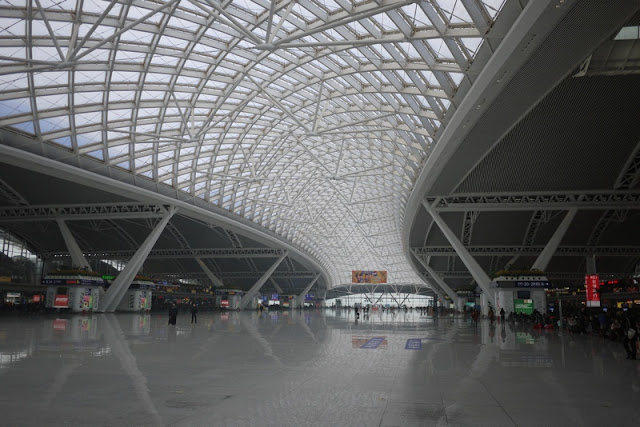 |
| If only I had roller blades with me. |
And after passing through security I was in the waiting area:
But there was no need to wait and I headed directly to the train:
While the train line I rode is sometimes referenced as "light rail", the trains do not in fact fit that classification. So, I will call it by its more proper name: the Guangzhou–Zhuhai Intercity Railway.
Traveling at speeds up to 200 km/h (124 mph) I arrived in about 50 minutes at the terminal station -- Zhuhai North Station. Apparently the line will someday extend to a more central location in Zhuhai. One can only hope. As it stood, after paying just 44 RMB (about US $7) for the train ticket I paid almost double that for the long taxi ride into town. City buses were available for only 1 RMB but they did not go exactly where I wanted and included many stops. Also, they were already full with recently arrived passengers, and I was not sure there would even be space for me when the next ones arrived. While I enjoy trying to ride "local" in China, this was a time where I decided to take a pass. Fortunately, I got my money's worth as my taxi driver apparently had aspirations to be a Formula One driver.
The day after arriving in Zhuhai I went to Macau. Similar to what I explained in my post about the border between Hong Kong and Shenzhen, you must pass out of mainland China through immigration in Zhuhai and then take a short walk before going through immigration once more to enter the special administrative region of Macau, despite it being part of China. And like Hong Kong, mainland Chinese need a special permit to enter Macau while many foreigners, including myself, only need a passport. From the time I left my hotel, walking to the border, going through two immigration channels, and finally arriving in Macau took less than one hour. It was even faster when I returned to Zhuhai due to shorter lines.
So, as you can see I've been busy moving about. No complaints from me though. The food in Macau is great:
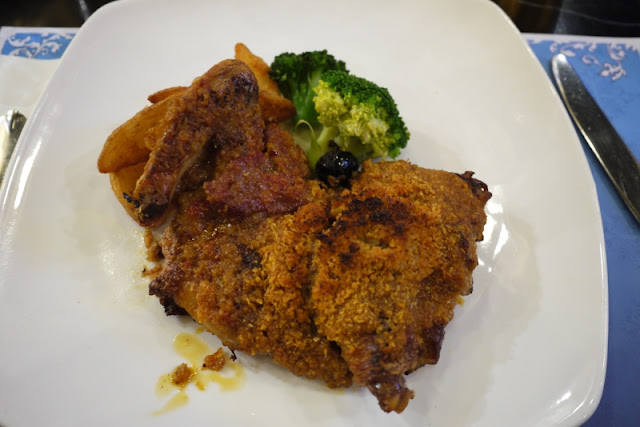 |
| African Chicken Macau Style |
And pretty decent food in Zhuhai can be very inexpensive:
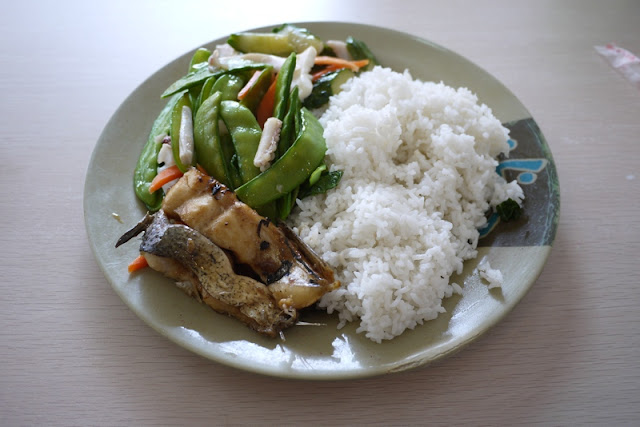 |
| Squid, fish, vegetables and rice for about US $1.40 |
I share all of this not only to provide a "taste" of some of my recent meals but also of some of the travel experience one can find in China. The high speed train ride was certainly a very different world from many other travel experiences I have had, such as a horse cart in Xizhou, Yunnan province.
More posts, including some about Guangzhou, Zhuhai, and Macau soon.
Update (July 25, 2012): For more about the extension of the Guangzhou-Zhuhai Intercity Railway see the newer post "The Future Intercity Railway Station at the Macau-Zhuhai Border".
Subscribe to:
Posts (Atom)

